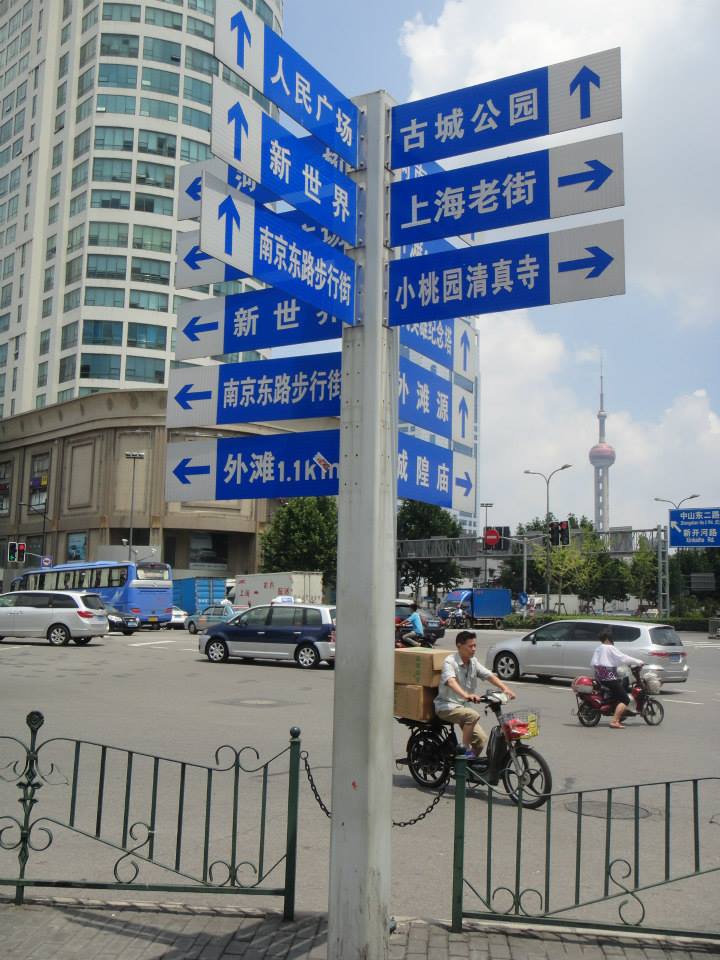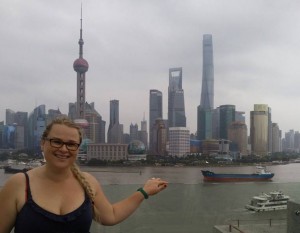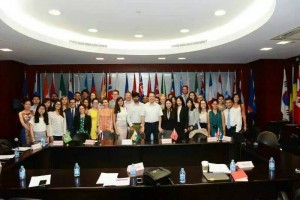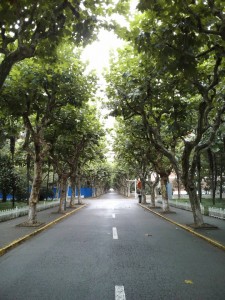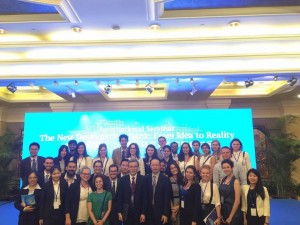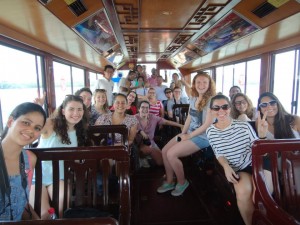Connie Louw-Smidt attended the Shanghai Summer School at Fudan University. Here is her story.
Pre-departure :
The days leading up to my departure for my Shanghai Summer School BRICS Program at Fudan University were filled with excitement, below are some pre-departure tips
Packing:
Remember to check the weather forecasts and climate for the months before you go. Since it is a summer school, it will be in Summer, and in many areas in China it gets seriously hot and humid, pack appropriately. And remember comfortable shoes to walk in!
Backpacks are the best kind of travel gear, I got one of those travel backpacks with the many straps and back support and it is completely worth it. Not only does it enable you to travel light (by forcing you to do so, as the volume is more limiting than regular suitcases) but it is also the easiest to carry around as you carry it through it becoming part of your body weight!
VISA application:
The application for the short term study visa, Category X2 (which is applicable for short cultural exchanges and summer schools) is the best to apply for. You can apply at the embassy or consulate nearest to you. As I am a Namibian citizen, I applied for my visa at the Chinese embassy in Windhoek, Namibia.
The process is not too complicated; it involves paperwork and handing in several documents such as colour passport size photos, your passport, the invitation letter from the Host University, proof of residence-which was provided by the Host University in China, and proof of your flight ticket (a reservation is adequate). Then you wait 5 working days for it to be issued. If however you need it issued faster, you can ask for this and pay an additional fee (about ZAR 300). I would suggest getting this done as soon as you have received your invitation letter and booked your flight ticket so as to limit stress and possible disappointment.
The Category X2 short term study visa grants you access to mainland China only (AKA you cannot travel to Hong Kong), for that you would need an additional tourist visa; pointing this out here so as to avoid disappointment if Hong Kong was on your travel bucket list whilst doing a short course in China.
Tech Guide:
Remember to pack all the necessary adapters for your chargers etc. (although in Shanghai they used the 2 point European sockets like we use in South Africa at various places).
It is very important to remember that the Chinese government blocks several webpages on the internet. You might know that Facebook isn’t allowed in China, but neither is Google (and all things Google related, such as Gmail), Instagram, Twitter and some others. If you are totally addicted to these websites, there are some ‘frowned-upon’ means to side step these regulations, educate yourself and download the necessary software before you go.
Do your homework beforehand:
Finally do some basic research about the University, City you’re going to, the province as well as China as a country. Learn a few phrases in Mandarin, and read up on some cultural cues-the East and West are indeed very different from one another.
Experience at Summer School:
I attended the Fudan University BRICS Summer School Programme, which focused on two broad themes, namely, ‘Global governance and cooperation among the BRICS countries’ and China’s Politics and Diplomacy. Lectures were scheduled for a morning session and then in the afternoon there would be a discussion session pertaining to the lecture during the morning session. There were lecturers from Fudan University in Shanghai as well as lecturers from other universities in China, as well as visiting lecturers from the other BRICS countries. In my opinion, the lecturers by the international, visiting lecturers were of a much better quality than those by the domestic lecturers, due to the fact that the lectures were more challenging and addressed deeper questions of ‘how’ and ‘why’ as opposed to just presenting ‘what’ is the case at hand. The lectures were not scheduled only during weekdays, but also on Saturdays and Sundays, and the programme had limited ‘free time’ in which to rest or explore Shanghai. However several days of planned activities were arranged, as well as a two-day excursion (more details below). Also, the Summer School included a BRICS simulation, as well as a written take-home exam at the end.
In terms of academics, in my opinion (as well as the other two South African students who attended from UCT), our standards our institutions are of a much higher quality than which I experienced at the Summer School. The core of the matter is that at the Political Science department at Stellenbosch University, we are taught to critically examine, discuss and argue our work and I felt that this critical thinking aspect is missing from the summer school. Its more about telling you what is instead of how it came about or why it is that way. I also experienced for the first time what ‘censorship’ meant in the sense that some students dared to ask some controversial questions (I did not), to some of the lecturers from China, and these questions were often deflected and did not get a straight-forward answer. I realised how lucky I have been to study International Relations at Stellenbosch University, where students are not only allowed to have their own opinions but encouraged to develop these in a critical manner!
Fudan University campus is beautiful with a lot of trees and gardens; some tree lined streets almost make you think of Victoria Street in Stellenbosch! Classrooms are fitted with air-conditioning, and the student canteen provides a variety of meals that you can buy with your student card. The international dormitories provided to the international students were, without being overly dramatic, really not of a great standard. I was lucky because my room and apartment (which is shared with three other students, sharing two bathrooms) was clean. This was however the exception as many of the rooms and bathrooms (mine included) were really dirty. Arriving at the dormitories was the first impression of the University and the Summer School and it was NOT a good one. In my opinion, this would never have been okay at our Maties Residences. On a positive note, the rooms did all have air-conditioning, which was wonderful considering the heat and humidity!
Some of the planned activities arranged in Shanghai included going to various museums and historic centres in the city. We also went to the opening ceremony of the New Development Bank (the BRICS led development bank, somewhat similar to the World Bank) that was launched in Shanghai, which was a great opportunity to attend an important, real life event very applicable to the subject of study of the Summer School. The two-day excursion took the whole group by bus to two towns near Shanghai, Hangzhou and Wuzhen. This was a great experience as we saw different shows, enjoyed impeccable Chinese cuisine and saw a different side of China than just the big city life of Shanghai.
Return:
Despite not returning to Stellenbosch after the Summer School (I was crazy enough to apply for a Summer School Programme in China and a Semester Exchange to Brazil in the same year, which means instead of going back to Stellenbosch University, I flew onward to my next adventure) going to China and attending the BRICS Summer School Programme has made me realise some new things about South Africa. Firstly, we are not the only developing country that has problems with inequality, all the other BRICS members (with perhaps the exception-to an extent-of Russia) struggle with this same societal issue and their governments are struggling with how to deal with it as well. Second, we are blessed in South Africa with a lot more open space and clean air and water, and that that in itself is something to be very grateful for! Being able to drink the water that comes of most taps in South Africa and not having to buy bottled water is a big blessing! Third, my experience at Fudan University made me realise the high standards that are held at Stellenbosch University. Fourth, that censorship sucks. In terms of not being able to say what you want to say about Government and Politics, but also because how does one function in a society without GOOGLE? I realised how much I used it when I could not anymore (for translations, maps, emails, getting the best results displayed with searches etc.). And that there is a reason why the Chinese Government blocks certain social media sites; social media is an important tool and should be used more bravely and intelligently by students and young professionals- it is a platform for change and sharing knowledge about everything that is important not only for fun videos and selfies (however, those are important as well). Finally, I realised how much I love South African cuisine and that a month without a braai is too long! It was really difficult adjusting to Chinese cuisine for me and made me appreciate my mom’s cooking even more!
My Summer School experience in China was eye-opening and horizon-broadening! I enjoyed the overall experience and learned a lot through the formal learning channels (i.e. lectures and discussions). However, it was the informal exchanges with the other students from the other BRICS countries (unfortunately not a lot of exchange with Chinese students as there were none that attended the Summer School, only the coordinators and student assistants were Chinese but were not as involved as the other Summer School Participants) where I learned the most. Its called networking but actually its just a lot of young people (and some older ones as well) interested in the same issue-area, making friends and discussing how to work towards the development of our countries as well as how to reach our own, individual goals. Going to China made me realise how much we have to be thankful for in South Africa, despite everything that is not going as good as it should!
谢谢 or Xièxiè (thank you in Mandarin)

